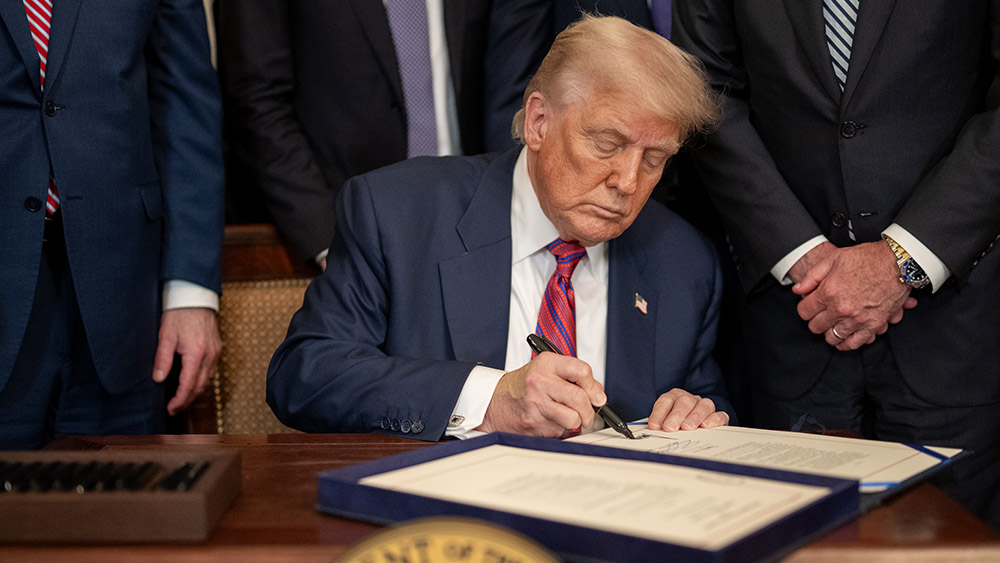The great NGO purge: Layoffs hit 22-year high as funding freezes amid RICO threats
- The U.S. nonprofit sector is experiencing a severe crisis, with job cuts surging 419 percent year-to-date compared to 2024.
- This turmoil coincides with a White House pressure campaign against left-leaning nongovernmental organizations (NGOs) accused of fomenting political violence.
- A leading conservative philanthropy CEO has publicly cautioned the administration against politically motivated investigations without clear evidence of legal wrongdoing.
- Investigative reports from conservative watchdogs allege that billionaire-funded networks have funneled over $100 million to radical political groups.
- The combination of government scrutiny and rising operational costs has led several major liberal foundations to freeze grantmaking and initiate widespread layoffs.
The American nonprofit sector, a sprawling and often opaque landscape of philanthropic organizations and activist groups, is confronting a dual crisis of existential proportions. A shocking surge in job losses, coupled with an intensifying White House campaign targeting alleged political weaponization by certain NGOs, has triggered a wave of panic and organizational paralysis. This convergence of economic distress and political pressure is reshaping the power dynamics of civil society, raising profound questions about the future of philanthropic freedom and the limits of political activism.
The data behind the upheaval
The scale of the sector’s contraction is quantified in stark terms by a recent report from the outplacement firm Challenger, Gray & Christmas. The data reveals a staggering 419 percent increase in job cuts within the nonprofit sector year-to-date, soaring from 5,329 positions in 2024 to 27,651 in 2025. This dramatic spike is attributed to a combination of factors, including rising operational costs and, critically, a significant chilling effect on fundraising and grantmaking. The report contextualizes this nonprofit apocalypse within a broader national trend of rising layoffs, which have hit their highest level for the month of October in 22 years.
The political crucible
This employment crisis unfolds against a highly charged political backdrop. Following the assassination of conservative commentator Charlie Kirk, the Trump administration pledged a forceful response to what it termed “domestic terrorism and organized political violence.” Senior administration officials, including Vice President J.D. Vance and adviser Stephen Miller, have declared war on radical left groups, vowing to dismantle the networks they believe fuel political unrest. The administration’s strategy appears focused on leveraging investigative and legal tools to scrutinize the financial underpinnings of these organizations. Actions such as dismantling USAID and threatening RICO charges against entities like the Open Society Foundations have sent shockwaves through the philanthropic world. The administration has also signaled interest in foreign-linked donors, including connections to Cuba and Chinese Marxist billionaire Neville Roy Singham.
A conservative voice of caution
Amid the escalating rhetoric, a notable voice of caution has emerged from within conservative philanthropy itself. Lawson Bader, president and CEO of DonorsTrust, a major donor-advised fund serving conservative and libertarian donors, has publicly warned the White House against pursuing investigations of liberal nonprofits without robust evidence of legal wrongdoing. Bader expressed alarm that “retaliatory rhetoric” could weaponize philanthropy in a manner “antithetical to philanthropic freedom.” He argued that any politically motivated assault on the nonprofit status of law-abiding organizations risks eroding the crucial boundary between citizen and state, a precedent that could eventually be turned against conservative causes.
Evidence and escalation
The administration’s aggressive posture is bolstered by investigative work from conservative watchdog groups. Organizations like the Capital Research Center and the Government Accountability Institute, led by researchers like Peter Schweizer and Seamus Bruner, have compiled extensive evidence using public tax filings. Their reports allege that foundations linked to billionaires like George Soros have funneled more than $100 million to what they describe as “pro-terror groups” and radical organizations. Bruner, addressing the issue publicly, stated, “When you shine light on billion-dollar NGO networks, they scramble… When you follow the money, the facts speak louder than spin.” This body of evidence provides the intellectual foundation for the administration’s claims that it is targeting not legitimate philanthropy, but organized political violence and foreign influence operations. The pressure has already yielded tangible results, with several prominent liberal foundations freezing or scaling back their grantmaking activities and adopting more cautious compliance practices to avoid legal exposure.
A sector transformed
The combined weight of a severe financial crunch and unprecedented federal scrutiny has left the nonprofit sector fundamentally transformed. Organizations across the political spectrum are operating in an environment of heightened fear and uncertainty, with leaders concerned that they could be the next target of an administrative or legal probe. The dramatic job losses are a direct symptom of this sector-wide retrenchment. The historical parallel is not to traditional economic downturns, but to moments of profound political realignment, where the institutions of civil society become primary battlegrounds for ideological conflict. The current crisis represents a critical test of the resilience and independence of the American nonprofit model.
A new frontier in political conflict
The turmoil within the nonprofit sector signals a new and volatile frontier in the nation’s political conflicts. The staggering job losses and frozen grantmaking are more than an economic indicator; they are the tangible fallout of a high-stakes struggle over the funding and operation of political activism in the United States. The administration’s crackdown, justified by its supporters as a necessary measure against violence and foreign influence, is viewed by its critics as an assault on civil liberties and philanthropic freedom. As organizations scramble to adapt and the human cost of layoffs mounts, the ultimate impact on American democracy and the balance of power between citizen groups and the state remains to be seen. The sector is now navigating an uncharted and perilous landscape, where its very survival may depend on its ability to weather this perfect storm of political and financial pressure.
Sources for this article include:
ZeroHedge.com
TheFP.com
CNBC.com
Read full article here


